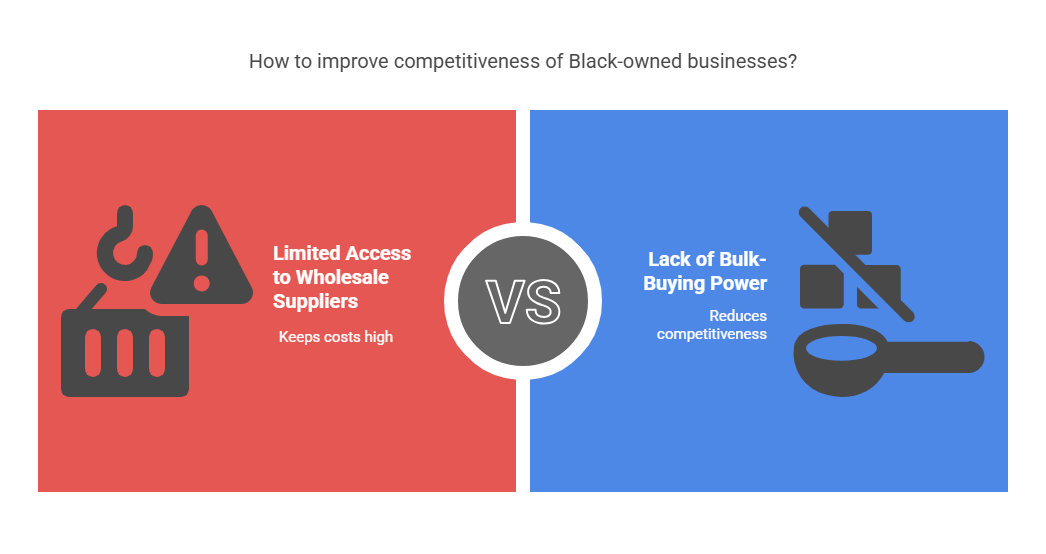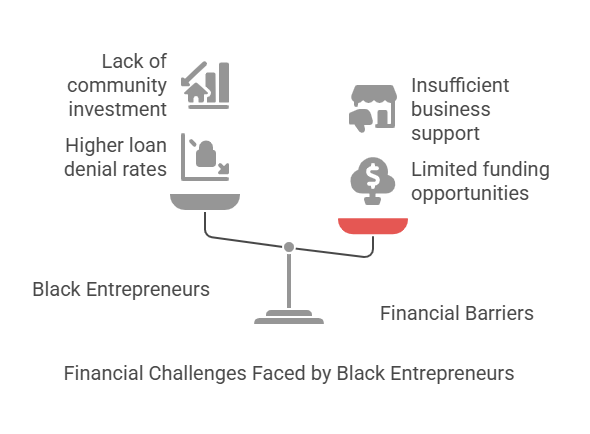
Introduction
Black neighborhoods are full of businesses. But too many of them aren’t Black-owned. From beauty supply stores to liquor shops and takeout restaurants, these businesses make millions each year. Yet, much of that money leaves the community instead of being reinvested.
Foreign-owned businesses dominate key industries in Black areas. They follow a proven system—buy in bulk, keep costs low, and use family labor.
They reinvest earnings, send their kids to top schools, and set up the next generation for success. Meanwhile, Black entrepreneurs struggle with high overhead, limited funding, and a lack of support.
The real question is: Why aren’t we running these businesses in our own neighborhoods? What barriers are keeping Black ownership from thriving? And most importantly, how do we reclaim economic control? It’s time to break it all down.

1. The Economic Takeover of Black Neighborhoods
📌 How Foreign-Owned Businesses Dominate
Walk through any Black neighborhood, and you’ll see who really owns the businesses. Non-Black entrepreneurs run convenience stores, liquor shops, takeout spots, and beauty supply chains.
These businesses generate millions of dollars in revenue each year. But instead of that money circulating in the community, it flows out to owners who don’t reinvest locally.
This isn’t just a coincidence. Foreign investors have built a stronghold in these industries. They recognize that Black communities are high-consumption markets.
They fill the demand, control the supply, and dominate entire sectors. Meanwhile, Black entrepreneurs struggle to enter these same industries due to financial barriers and lack of community infrastructure.
📌 The Blueprint for Success Used by Non-Black Business Owners
There’s a system behind this success. Many non-Black entrepreneurs follow a specific business model that allows them to thrive in Black communities. Here’s how they do it:
✅ Direct supply chains – They cut out the middleman, sourcing products directly from manufacturers and wholesalers. This lowers costs and keeps their profit margins high.
✅ Bulk purchasing power – They buy inventory in large quantities, reducing their costs and making their products cheaper than competitors.
✅ Family labor model – Many of these businesses are family-run, meaning they pay little to no wages for staffing. Lower labor costs mean higher profits.
✅ Strategic reinvestment – They don’t just spend their earnings. They reinvest in more businesses, fund their children’s education, and expand their operations.
This long-term mindset creates generational wealth, something Black communities struggle to build. The challenge isn’t just competition—it’s a lack of access to the same resources and strategies. The question is: How can Black entrepreneurs flip the script and reclaim ownership?
2. Why Black Businesses Struggle to Compete
📌 High Overhead Costs

Black entrepreneurs face higher costs from the start. Unlike foreign-owned businesses, many don’t have access to wholesale suppliers. This means they pay more for inventory, making their products less competitive.
Bulk buying helps businesses reduce costs and increase profit margins. But without strong supplier relationships or large capital reserves, many Black-owned businesses can’t compete on price. This forces them to charge higher prices, making it harder to attract and retain customers.
📌 Limited Funding & Financial Barriers

Getting funding is another major hurdle. Black entrepreneurs are denied loans at higher rates than other groups. Even with good credit and strong business plans, many face discrimination from banks and lenders.
There are also fewer investment programs in Black neighborhoods. Many communities lack business incubators, local investment funds, or government-backed incentives to help Black-owned businesses grow. This makes it difficult to secure retail space, expand operations, or access business grants.
Without proper funding, Black businesses struggle to scale. They often start small and stay small, unable to compete with larger, well-funded competitors.
📌 Lack of Infrastructure & Business Support

Business success isn’t just about money—it’s about mentorship, networks, and resources. In industries where non-Black businesses dominate, Black entrepreneurs often lack mentors and business coaches who can help them navigate the market.
Few cooperative networks allow Black business owners to share resources, exchange knowledge, or access group-buying power. Without this support, many Black businesses operate in isolation, making it harder to succeed long-term.
Another issue is low reinvestment rates from successful Black businesses. Unlike foreign-owned businesses that fund new ventures and reinvest in their communities, many Black entrepreneurs struggle alone, without an ecosystem to support new startups.
For Black businesses to thrive, there needs to be a shift toward collaboration, resource-sharing, and long-term reinvestment. The challenge isn’t just starting a business—it’s sustaining and growing it in a system built to exclude us.

3. Flipping the Game: How Black Entrepreneurs Can Reclaim Ownership
📌 Building a Direct Supply Chain
Black businesses must control the supply chain to compete. Right now, many rely on suppliers who don’t have their best interests in mind.
The solution? Partnering with Black-owned suppliers and manufacturers to keep costs low and profits within the community.
Creating business cooperatives is another key strategy. If multiple Black businesses buy in bulk together, they can reduce expenses and access wholesale pricing.
This would allow Black entrepreneurs to compete with foreign-owned businesses that dominate Black neighborhoods. Strength in numbers leads to economic power.
📌 Community Investment & Financial Literacy
Funding is a major barrier, but Black-owned banks and credit unions can be a solution. If more Black entrepreneurs use Black financial institutions, they can gain better access to business loans, credit, and funding opportunities. This money can circulate within the community instead of leaving it.
Group economics is also key. Black consumers must prioritize supporting Black businesses, but it goes deeper than that. Established business owners should mentor new entrepreneurs, invest in startups, and create financial networks that help businesses scale. A strong economy requires continuous reinvestment.
📌 Empowering the Next Generation
Black ownership can’t be a short-term fix—it has to be a generational movement. That means training young Black entrepreneurs in the skills needed to run successful businesses.
Schools and community programs should prioritize STEM, finance, and trade education. Teaching Black youth about business ownership, supply chain management, and economic power will ensure they are prepared to step into leadership roles. The goal isn’t just to own businesses—it’s to build legacies.
The blueprint for success already exists—others have been using it in our communities for decades. Now, it’s time to apply those same strategies and reclaim economic power for ourselves.
Conclusion
The dominance of foreign-owned businesses in Black communities isn’t random—it’s strategic. These business owners follow a proven blueprint: direct supply chains, bulk purchasing, family labor, and reinvesting profits into their future generations.
Meanwhile, Black entrepreneurs face higher costs, limited funding, and little community infrastructure to support long-term success. That is why black businesses struggle.
But that doesn’t mean the game can’t be flipped. Black entrepreneurs must learn, adapt, and execute these same strategies to reclaim economic power.
Building supply chains, increasing financial literacy, and investing in community businesses are all necessary steps. When Black-owned businesses support each other, they create an ecosystem that strengthens the entire community.
The future of Black business ownership depends on collaboration, education, and reinvestment. It’s not enough to own a business—we must create systems that allow more Black businesses to thrive.
🚀 If others can do it in our communities, why can’t we? The time to reclaim ownership is now.
FAQ: Black Business Ownership & Economic Empowerment
1. Why do foreign-owned businesses dominate Black neighborhoods?
Foreign business owners follow a proven strategy—bulk purchasing, direct supply chains, and reinvesting profits. They keep costs low, pass businesses down to their children, and expand into multiple locations. Meanwhile, Black entrepreneurs struggle with higher overhead costs, limited funding, and fewer resources to scale their businesses.
2. What are the biggest challenges Black-owned businesses face?
The biggest challenges include high startup costs, lack of access to wholesale suppliers, limited funding options, and little community reinvestment. Many Black business owners also lack mentorship, networking opportunities, and cooperative business models that help businesses thrive.
3. How can Black-owned businesses compete with foreign-owned businesses?
Black entrepreneurs can compete by building direct supply chains, forming business cooperatives, and supporting Black-owned banks. This will lower costs, increase buying power, and keep wealth circulating within the community.
4. How can consumers support Black-owned businesses?
Consumers can support by intentionally shopping at Black-owned stores, using Black financial institutions, and promoting local Black businesses. Supporting group economics—where money circulates within the community—helps Black businesses stay competitive.
5. What’s the long-term solution for increasing Black business ownership?
The key is education, collaboration, and reinvestment. We must train Black youth in entrepreneurship, finance, and supply chain management.
Established businesses must mentor new entrepreneurs and invest in community startups. Rebuilding Black economic power requires a long-term commitment to ownership and financial literacy.
